Food as Medicine: Ways to Live Beautifully & Healthily
Mar 22,2013
Food as Medicine: Ways to Live Beautifully & Healthily
Mar 22,2013
In this series, our editors Nobue and Miyoko look for tips to this question by speaking with experts on such topics as food, customs, Japan, and traditional lifestyles.
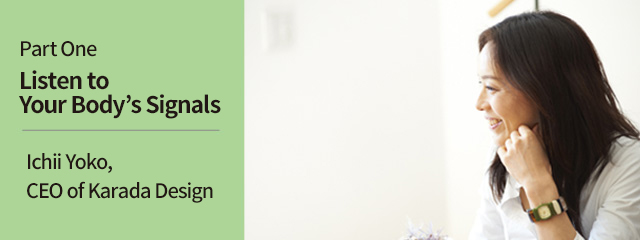
Nobue:It’s getting warmer these days.
Miyoko:It certainly is. But my hay fever allergy is really acting up, and I’m not feeling like myself. I just don’t seem to have much energy in the spring.
Nobue:You too? We should be feeling energized by the warmer weather, but for some reason, we don’t. Let’s hear what today’s expert guest, Ichii Yoko, has to say about this.
Nobue:Ichii, for some reason my physical condition always gets worse in the springtime.
Miyoko:Me too. I just can’t seem to get myself going. Why do you think that is?
Ichii:I think both of your bodies have transitioned into spring mode.
Miyoko:Our bodies are in spring mode?
Ichii:That’s right. We humans are animals. And just like animals that become more active in the springtime, our human bodies try to transition into their spring mode. In chiropractic terms, this involves movements that try to loosen the bones in the lumbar region, particularly the fourth lumbar vertebra. This process, however, causes our bodies to feel wobbly or unstable. In response, people tend to tense up their upper body to support their lumbar region. But this in turn, leads to stiffness, which is affecting more people these days.
Nobue:This stiffness in the body, is it like a kind of tension?
Ichii:Exactly. This is why more people start complaining about headaches, stiff shoulders, dizziness, and joint pain, beginning right around the first week in February. Many also experience diarrhea or fevers. This year was a bit early, with people noticing these changes as early as mid-January.
Miyoko:The transition to spring can have such a big impact …
Ichii:It’s not just spring. The environmental changes during the transitions between seasons can put stress on the human body. However, some people are better at handling this kind of stress, whereas others are profoundly affected by the stress.
Nobue:What do you mean by handling stress?
Ichii:I often use the example of a willow tree. When a willow tree is hit by a powerful force like a gale, it doesn’t snap and break like some other trees; instead, it bends and absorbs the force. I think it’s important for us to develop the physique to absorb stress much like a willow tree. If you can build up your body to be like this, then you’ll be able to better mitigate the stress that comes with the transitions between seasons.
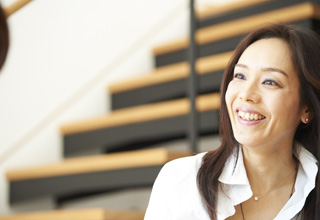
Ichii:When you think of chiropractic, what do you think of? Do you think of applying strong pressure in tight or stiff areas to relax them and to straighten out the symmetry of your body?
Miyoko:Is that not correct?
Ichii:The true meaning of a body properly ordered through chiropractic is a supple body that can adapt flexibly to changes in the environment.
Miyoko:So what you mean is the flexibility to adapt to changes varies from person to person, which is why some people develop symptoms and others don’t.
Ichii:That’s right. The body tries to adapt to changes through what is known as a destructive process, which manifests itself in the body as the various symptoms we have been talking about. People differ in how flexibly they can engage in these processes, which determines how well they can absorb and then eliminate external changes.
Nobue:What is different about people who develop severe symptoms and those who do not?
Ichii:It’s related to how many years a person has experienced the triggers and the person’s past living conditions. For example, when a cold virus enters the body, children often develop a sudden high fever but recover quickly the next day. Adults, on the other hand, tend to complain about prolonged low-grade fevers. This phenomenon is explained by an increase in people who can’t quickly eliminate from their body viruses or other external agents deemed harmful, either because their capacity to detect harmful agents is diminished or their sensitivity to them is reduced. If your body has the sensitivity to quickly react to external agents and quickly eliminate them, you won’t feel unwell for extended periods.
Miyoko:So the appearance of symptoms itself is not necessarily a bad thing.
Ichii:Correct. If your body reacts quickly, that’s a good thing. In the past, when people felt their body react like this, they would think “Uh oh, I’ve pushed myself too hard” and would take measures like keeping themselves warm and getting plenty of rest. This is what we mean by recuperation. In our times, however, we immediately reach for some medicine to suppress the symptoms. In effect, we are ignoring our body’s signals. If we repeatedly ignore these warnings from our body, it will stop complaining about the symptoms. Over time, the body will stop sending signals to us and we will become desensitized to harmful agents.
Nobue:It’s scary to think that taking medicine with good intentions to suppress symptoms could lead to such desensitization.
Ichii:It definitely is scary. And this sensitivity that we are talking about affects more than the body; it affects the mind too. If you continue to ignore the body’s signals, your mind may also become less responsive.
Nobue:Your mind too?
Ichii:When the mind becomes inflexible, so too does the body. The reverse is also true. By observing a person’s physique and how they use their body, you can get a general idea of the person’s personality and how they think. If your body becomes stiff and inflexible, it can lead to changes in your mind, such as losing empathy for others or becoming inconsiderate. If you become emotionally unresponsive to others, then it’s only natural that you become less interested in romance…
Nobue / Miyoko:Wow! That’s terrible. Does this explain the phenomenon of soshoku-danshi [men who avoid romantic relationships with women]?
Ichii:I believe there is some kind of connection. Soshoku-danshi has become a buzzword, but it has implications for the fundamental preservation of the human species, so it’s not really a term we should be entertained by.
Nobue / Miyoko:For sure…
Ichii:Of course, I’m not suggesting that you shouldn’t take medicine when needed or that everything was better in the past. It’s undeniable that life was much harsher for people who lived in the centuries without modern medicine. What I’m saying is that we should not continually ignore our body’s signals simply because we are busy, and instead, we should occasionally take the time to listen carefully to our body and develop a flexible body that can successfully manage and eliminate symptoms when they arise. It is vital for people in today’s stressful world to have the awareness to take a moment and rest and recuperate instead of running nonstop.
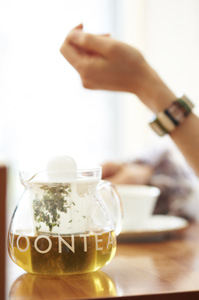
Miyoko:Aah-choo!
Ichii:Are you suffering from hay fever? Hay fever is also connected to what we are talking about.
Miyoko:How so?
Ichii:From a holistic perspective, sneezing once and feeling relieved is not the end point. The destructive process carries on bit by bit, and this suggests that you can improve how you condition your body from last spring and over the winter months.
Miyoko:What kind of improvements?
Ichii:Speaking from a chiropractic point of view, when tension accumulates in the upper chest rather than the lower back, the intercostal space stiffens and hay fever and other symptoms are more likely to occur. It’s important to learn how to use your body properly at all times and to relax any stiff and congested areas.
Furthermore, the connection between allergies and diet — namely, maintaining your gut microbiome — is inseparable. There are many cheap, convenient, flavorful, and stimulating foods available to us that provide an immediate sense of satisfaction. Do you tend to choose such foods? Such diets, however, often lead to intestinal harm.
Miyoko:So there’s a relationship between this type of intestinal harm and allergies?
Ichii:It’s conceivable that there is a strong connection. So to mitigate springtime symptoms, you have to reevaluate your entire lifestyle, including your diet.
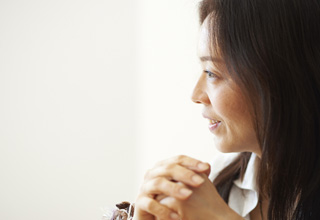
Nobue:So, Ichii, what type of food should we eat?
Ichii:Hold on! You’re always seeking out something to eat to solve your problems.
Nobue:Isn’t that what we are looking to do?
Ichii:Food is not medicine. People today have a bad habit of immediately treating food like medicine. Food is life. When reevaluating your lifestyle, it’s important to consider what aspects of your current lifestyle are problematic. Each person will have their own problems, such as when they eat, how they eat, and their food preferences. Instead of trying to remedy things by eating something, first off, think about what food your body doesn’t need and cut those things out.
Miyoko:Cut out things your body doesn’t need…
Nobue:Like junk food…
Miyoko:Or sweets…
Ichii:That’s right. I used to crave junk food, chocolate, cake, and other things when I was tired. There was a time in my life where my physical condition was exceptionally bad.
Miyoko:Even you?
Ichii:That’s precisely why I studied all kinds of approaches to food and diet. The problem is even after people learn strict dietary principles, many find it hard to keep up the practice at home. Forcing yourself to follow a strict diet can make life feel like you live only to diet. As a homemaker, I realized that I have to incorporate these practices into my routine in a way that’s sustainable. This is how I came up with the concept of “healing food”, which involves improving your constitution without rebounding. Meals are life. No matter how good something is for your body, it amounts to nothing if you can’t sustain it. That’s why the foundation of this concept are foods that are delicious, simple, and accessible. Closely tied to this concept are traditional Japanese foods. And fermented foods are some of the best traditional Japanese foods. The fermented foods our ancestors carefully cultivated are wonderful inventions that are perfectly in harmony with this soil, seasons, and climate. Japanese seasonings like soy sauce, miso, vinegar, and saké are all fermented foods made by microorganisms. Of course, koji malt and saké lees are also examples. By incorporating these living microorganisms into our diet, we can create meals that nourish the body. And all of these can be incorporated into our daily routines.
Nobue:So, unsurprisingly, traditional Japanese meals are good for the body.
Miyoko:We should incorporate as many of them as possible into our lives.
Ichii:Yes, you should. But I fear that people reading this will confuse the means with the end.
Miyoko:The means with the end?
Ichii:A common problem is people often become so fixated on what they think is good — whether it’s exercise or diet — that they lose sight of why they are exercising in a certain way or why they are following a certain diet. What you have to remember is that both exercise and dietary practices are means to achieving good health. Becoming all consumed with the things you “must” do is to swap the means for the end, which isn’t very meaningful. Moreover, being healthy is not the end goal, but the foundation. My hope is people will use this foundation to pursue their work, their dreams, or whatever they want to accomplish beyond health and to connect these things to their self-realization. I’m sure you two have things you want to achieve. For me, I want to support people to achieve their dreams beyond health while helping them become healthier.
Miyoko:I see. That makes sense.
Nobue:I feel somehow more energized now.
Nobue / Miyoko:Ichii, thank you so much for your time today.
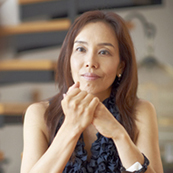
CEO of Karada Design
CEO of Karada Design
Based on the principles of holistic medicine, Ichii has developed healing food, a concept for simple, sustainable dietary improvements that respects the body’s natural rhythms, and self-body design, a method of balancing muscle tone and energy flows and regulating the body. With these methods, she guides people on enjoyable holistic self-care lifestyles.
Ichii is a certified physical therapist, certified chronic disease prevention therapist, holistic self-care coordinator, healing food researcher, a professional member of the Japan Holistic Medical Society and Kanto administration committee member, and member of the Natural Hygiene Promotion Association.
She is the author of Chiropractic Care for Women Over 40: Stay Beautiful for Life (Aspect).